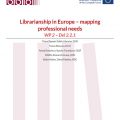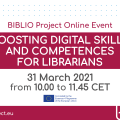
03 Feb New Biblio project to boost digital skills and competences for librarians in Europe
03 Feb, 2020
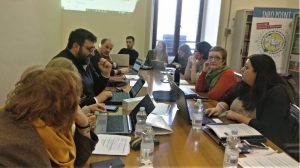 The digital transformation has challenged various aspects of our society, including the traditional notion of public libraries.
The digital transformation has challenged various aspects of our society, including the traditional notion of public libraries.
On the one hand, today people get their information online, and they want not only to consult the digital content, but often to re-work it. Therefore, libraries should be prepared to facilitate this creative use of digital archives to produce new digital content through multiple tools and technologies.
On the other hand, to stay competitive, libraries always look for various ways to attract users. In addition to being a traditional place for study, libraries host events, provide training, and offer recreational and cultural activities.
All those developments have challenged the role of physical libraries and librarians. The libraries are regularly re-assessing existing services and offering new ones, and in order to support these new activities, librarians must be equipped with the right skill sets. This versatility of services requires librarians to develop advanced competences to be able to adapt the infrastructure, to offer those diverse services on demand, and to pass on digital skills to users.
But very few libraries and librarians have met this demand so far. Libraries staff need training to cope with multitudes of topics, and their professional preparation must reflect the reshaped concept of the librarian profession.
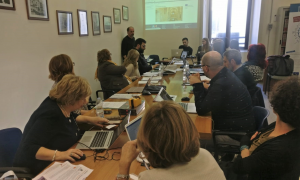 To address the skills gap in the library sector due to digital transformation, the Biblio project has been created by the consortium of 10 partners from five countries. The partnership includes sectoral organisations – national and international library networks and organisations; VET providers, a university and two European networks in digital skills and library professionals. It received the funding through Erasmus+ KA2 Cooperation for innovation and the exchange of good practices – Sector Skills Alliances.
To address the skills gap in the library sector due to digital transformation, the Biblio project has been created by the consortium of 10 partners from five countries. The partnership includes sectoral organisations – national and international library networks and organisations; VET providers, a university and two European networks in digital skills and library professionals. It received the funding through Erasmus+ KA2 Cooperation for innovation and the exchange of good practices – Sector Skills Alliances.
The three-year project targets library professionals, unemployed people in the library sector by enabling them to offer innovative services for users. It facilitates the acquisition of digital and transversal skills for library professionals by setting up a system for skills assessment, learning offer, validation, and recognition.
On 27-28 January 2020, the project was kicked-off in Bari hosted by the project coordinator – the University of Bari Aldo Moro. During meeting, the partners discussed various work packages and challenges, defined the priorities and set the action plan for the first year. On Day 1 the partners talked about the management and communication, prepared for the needs analysis research, got introduced to the coaching circle methodology and the good practices in mapping emerging job roles, based on the experience of MuSA project. The second days was devoted to the VET curricula, MOOC design and delivery, specialisation course for library professionals, and project dissemination activities.
WHAT WILL BE DONE?
The project starts with analyzing the training needs and offers in the library sector, in order to identify a set of emerging job role profiles. For each profile, a modular VET curriculum addressing EQF Level Five will be designed, applying a specific VET methodology based on learning outcomes and on the blended learning principles. The curricula will be based on a set of digital OERs (Open Educational Resources) supporting the acquisition of 40+ digital and transversal competences.
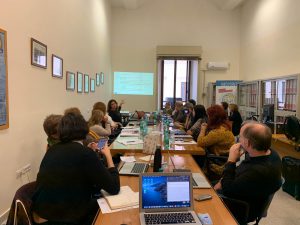 Biblio will use the DigComp framework in order to map the learning outcomes of the new VET curriculum to the five different areas of the framework.
Biblio will use the DigComp framework in order to map the learning outcomes of the new VET curriculum to the five different areas of the framework.
Based on the identified training contents, the partners will develop:
1) A MOOC addressed to European library professionals to help them gain identified competences (6-8 weeks, 100 librarians per piloting country; 400 total)
2) A Specialization Training course (240 hrs total; 25 trainees per country), including: face-to-face (20 hrs/5 days), online learning (160 hrs), project-based learning (40 hrs) and work-based learning (165 hrs) phases.
The work-based learning will support the creation of a mobile and qualified workforce, able to respond to the challenges of everyday work, as participants will have the opportunity of learning by doing.
- Training will be delivered via an online platform that stimulates sharing and exchange of knowledge, experiences and best practices.
- Work-based learning will be based on the principle of inter-generational learning
- European instruments will be applied: EQF – European qualifications framework, ECVET – European credit system for vocational education and training, and EQAVET – the European Quality Assurance in Vocational Education and Training
- Job role profiles will be mapped to ESCO – Classification of European Skills, Competences, Qualifications and Occupations and e-CF – European e-Competence Framework
The project will produce at least 40 modules, and the training programme will be tested in Bulgaria, Greece, Italy, and Latvia.
>> Learn more about the partnership, the project and expected results
>>Follow BIBLIO PROJECT on dedicated accounts on FACEBOOK and on TWITTER and by checking hashtag #DigitalBiblio
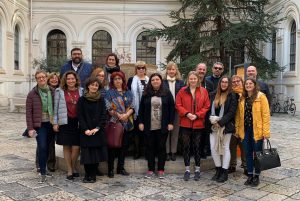
PARTNERSHIP
- University of Bari Aldo Moro (UNIBA), Italy – coordinator
- The Central Institute for the Union Catalogue of Italian Libraries and Bibliographic Information (ICCU), Italy
- European Grants International Academy (EGInA), Italy
- Center for vocational training at University of Library Studies and Information Technologies (ULSIT), Bulgaria
- Global Libraries – Bulgaria Foundation (GLBF), Bulgaria
- SIA DMG – Data Media Group, Latvia
- Culture Information Systems Centre (KISC), Latvia
- Hellenic Open University (HOU), Greece
- ALL DIGITAL, Belgium
- Public Libraries 2030 (PL2030), Belgium




